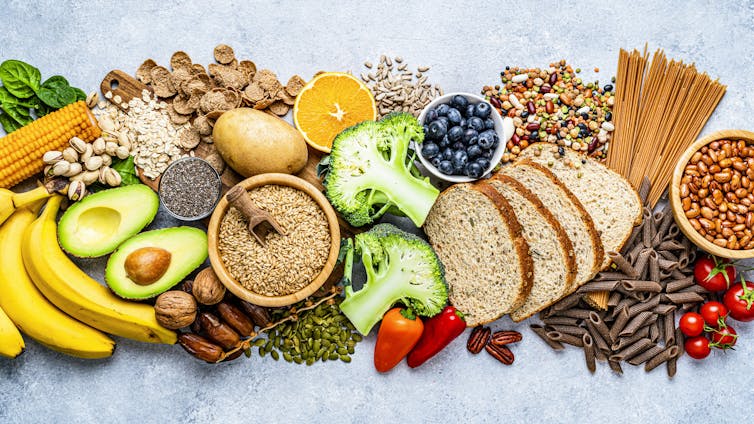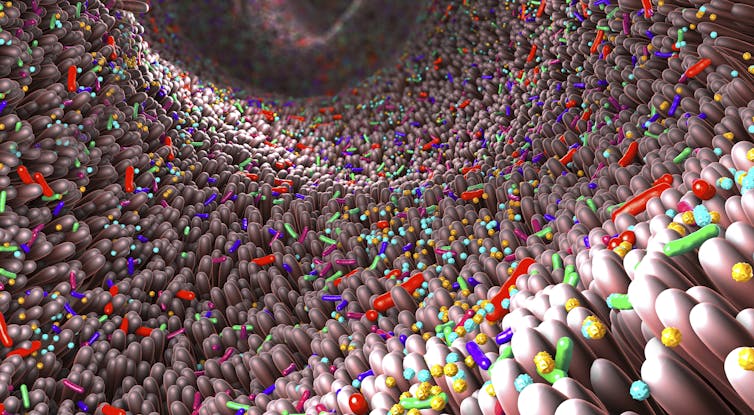
Is the adage “calories in, calories out” true? The short answer is yes, but the full story is more nuanced.
From the moment food touches your tongue to the time it leaves your body, your digestive system and gut microbiome work to extract its nutrients. Enzymes in your mouth, stomach and small intestine break down food for absorption, while microbes in your large intestine digest the leftovers.
“Calories in, calories out” refers to the concept that weight change is determined by the balance between the calories you consume and calories you expend. This includes not only the number of calories you eat due to appetite and absorb via digestion, but also how well those absorbed calories are burned through metabolism.
Recent research indicates that a significant factor influencing people’s variable appetites, digestion and metabolism are biologically active leftover components of food, known as bioactives. These bioactives play a key role in regulating the body’s metabolic control centers: your brain’s appetite center, the hypothalamus; your gut’s digestive bioreactor, the microbiome; and your cells’ metabolic powerhouses, the mitochondria.
I’m a gastroenterologist who has spent the past 20 years studying the gut microbiome’s role in metabolic disease. I’ll share how dietary bioactives help to explain why some people can eat more but gain less, and I’ll offer some dietary tools to improve metabolism.
Table of Contents
Ruminating on appetite and digestion
Research has shown that consuming whole foods still “packaged” in their original fibers and polyphenols – the cellular wrappers and colorful compounds in plants that confer many of their health benefits – leads to more calories lost through stool, when compared with processed foods that have been “predigested” by factories into simple carbs, refined fats and additives.
This is one way calorie-free factors influence the “calories in, calories out” equation, which can be beneficial in a society where calorie intake often exceeds needs. Eating more whole foods and less processed foods simply lets you eat more because more of those unprocessed calories go out the other end unused.

fcafotodigital/E+ via Getty Images
Fiber and polyphenols also help regulate your appetite and calorie intake through the brain. Your microbiome transforms these leftover bioactives into metabolites – molecular byproducts of digestion – that naturally decrease your appetite. These metabolites regulate the same gut hormones that first inspired the popular weight loss drugs Wegovy, Ozempic and Mounjaro, controlling appetite through your brain’s satiety center, the hypothalamus.
Processed foods lack these bioactives and are further formulated with salt, sugar, fat and additives to be hyperpalatable, causing you to crave them and eat more.
Mitochondrial maestros in the middle
A full accounting of calories also depends on how effectively your body burns them to power your movement, thoughts, immunity and other functions – a process largely orchestrated by your mitochondria.
Healthy people typically have high-capacity mitochondria that easily process calories to fuel cellular functions. People with metabolic diseases have mitochondria that don’t work as well, contributing to bigger appetites, less muscle and increased fat storage.
They also have less of a mitochondria-rich type of fat called brown fat. Rather than storing calories, this fat burns them to produce heat. Less brown fat may help explain why some people with obesity can have lower body temperatures than those who aren’t obese, and why there has been a decline in average body temperature in the U.S. since the industrial revolution.
Healthy mitochondria that burn more calories might also help explain why some people can eat more without gaining weight. But this raises the question: Why do some people have healthier mitochondria than others?
Your mitochondrial health is ultimately influenced by many factors, including those usually associated with overall well-being: regular exercise, adequate sleep, stress management and healthy eating.
Who turned off the metabo-lights
The latest nutrition research is revealing the roles that previously underappreciated dietary factors play in mitochondrial health. Beyond the essential macronutrients – fat, protein and carbohydrates – and micronutrients such as vitamins and minerals, other leftover factors in food, including fibers, polyphenols, bioactive fats and fermentation products, are also key for metabolism.
Unlike a Western diet, which often lacks these bioactives, traditional diets such as the Mediterranean and Okinawan diets are rich in foods – nuts, seeds, fruits, vegetables, whole grains and fermented foods – replete with these factors. Many bioactives pass undigested through the small intestine to the large intestine, where the microbiome converts them into activated metabolites. These metabolites are then absorbed, influencing the number of mitochondria in cells and how they function.
At the most fundamental level of cell biology, metabolites turn on and off molecular switches in your genes through a process called epigenetics that can affect both you and your offspring. When the metabolic “lights” are turned on, they enliven the mitochondria responsible for a faster metabolism, effectively increasing the calories you use.
Please mind the microbiome gap
A healthy microbiome produces a full range of beneficial metabolites that support calorie-burning brown fat, muscle endurance and metabolic health. But not everyone has a microbiome capable of converting bioactives into their active metabolites.
Long-term consumption of processed foods, low in bioactives and high in salt and additives, can impair the microbiome’s ability to produce the metabolites needed for optimal mitochondrial health. Overuse of antibiotics, high stress and lack of exercise can also adversely affect microbiome and mitochondrial health.

Christoph Burgstedt/Science Photo Library via Getty Images
This creates a double nutrition gap: a lack of healthy diet and a deficiency in the microbes to convert its bioactives. As a result, well-studied nutritional approaches such as the Mediterranean diet might be less effective in some people with an impaired microbiome, potentially leading to gastrointestinal symptoms such as diarrhea and negatively affecting metabolic health.
In these cases, nutrition research is exploring the potential health benefits of various low-carb diets that may bypass the need for a healthy microbiome. While the higher protein in these diets can reduce the microbiome’s production of beneficial metabolites, the lower carbs stimulate the body’s production of ketones. One ketone, beta-hydroxybutyrate, may function similarly to the microbiome metabolite butyrate in regulating mitochondria.
Emerging microbiome-targeting approaches might also prove helpful for improving your metabolic health: butyrate and other postbiotics to provide preformed microbiome metabolites, personalized nutrition to tailor your diet to your microbiome, intermittent fasting to help repair your microbiome, and the future possibility of live bacterial therapies to restore microbiome health.
Tools to transform fat into fuel
For most people, restoring the microbiome through traditional diets such as the Mediterranean diet remains biologically achievable, but it is not always practical due to challenges such as time, cost and taste preferences. In the end, maintaining metabolic health comes back to the deceptively simple healthy lifestyle pillars of exercise, sleep, stress management and nutritious diet.
Some simple tips and tools can nonetheless help make nutritious diet choices easier. Mnemonics such as the 4 F’s of food – fibers, polyphenols, unsaturated fats and ferments – can help you focus on foods that best support your microbiome and mitochondria with “leftovers.” Bioactive-powered calculators and apps can also aid in selecting foods to control your appetite, digestion and metabolism to rebalance your calorie “ins and outs.”
![]()
Christopher Damman is on the scientific advisory board at Oobli, Supergut, and One BIO.
























